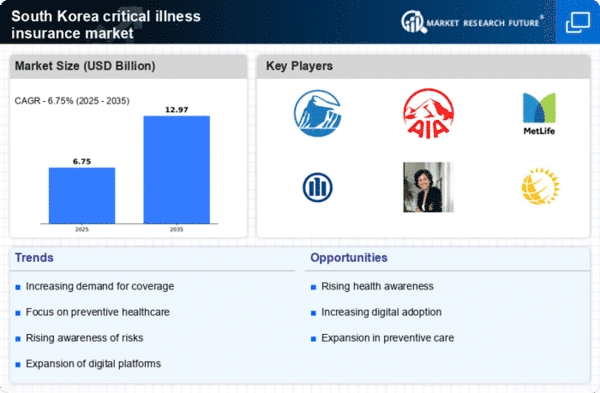Aging Population
The demographic shift towards an aging population in South Korea is poised to impact the critical illness-insurance market significantly. With a growing number of individuals aged 65 and older, the prevalence of chronic diseases and critical health conditions is expected to rise. Data indicates that by 2025, approximately 20% of the population will be over 65 years old, leading to increased demand for insurance products that cover critical illnesses. This demographic trend suggests that insurers may need to adapt their offerings to cater to the specific needs of older adults, thereby driving growth in the critical illness-insurance market. As the population ages, the focus on preventive care and financial security will likely become paramount.
Government Initiatives
Government initiatives aimed at promoting health insurance coverage are likely to play a crucial role in shaping the critical illness-insurance market. Policies that encourage individuals to obtain insurance, such as tax incentives or subsidies, may enhance accessibility and affordability. Recent legislative measures have focused on expanding insurance coverage options, which could lead to increased participation in the critical illness-insurance market. This supportive regulatory environment appears to foster a culture of insurance uptake, as consumers are motivated to secure their health against potential critical illnesses. As these initiatives continue to evolve, they may significantly impact the market landscape.
Rising Health Awareness
There is a noticeable increase in health awareness among the South Korean population, which is influencing the critical illness-insurance market. As individuals become more informed about health risks and the importance of early detection, they are more inclined to invest in insurance products that provide coverage for critical illnesses. Educational campaigns and health initiatives have contributed to this heightened awareness, leading to a greater understanding of the financial implications of serious health conditions. Consequently, this trend suggests that the critical illness-insurance market may experience growth as consumers actively seek to protect themselves and their families from potential health crises.
Enhanced Product Offerings
Insurers in South Korea are increasingly innovating their product offerings within the critical illness-insurance market. The introduction of tailored policies that address specific health concerns, such as cancer or heart disease, appears to resonate well with consumers. Additionally, the integration of wellness programs and preventive care incentives into insurance plans may enhance their appeal. Market data suggests that insurers who offer comprehensive coverage options, including critical illness riders, are witnessing a surge in policy uptake. This trend indicates that consumers are seeking more than just basic coverage; they desire products that align with their health needs and lifestyle choices. As a result, the critical illness-insurance market is likely to benefit from these enhanced offerings.
Increasing Healthcare Costs
The rising costs associated with healthcare in South Korea appear to be a significant driver for the critical illness-insurance market. As medical expenses escalate, individuals are increasingly seeking financial protection against unforeseen health issues. Reports indicate that healthcare spending in South Korea has grown by approximately 7% annually, prompting consumers to consider insurance options that can alleviate the financial burden of critical illnesses. This trend suggests a growing recognition of the importance of having adequate coverage, as individuals aim to safeguard their financial stability in the face of rising medical costs. Consequently, the critical illness-insurance market is likely to experience heightened demand as consumers prioritize securing their health and financial well-being.
















Leave a Comment